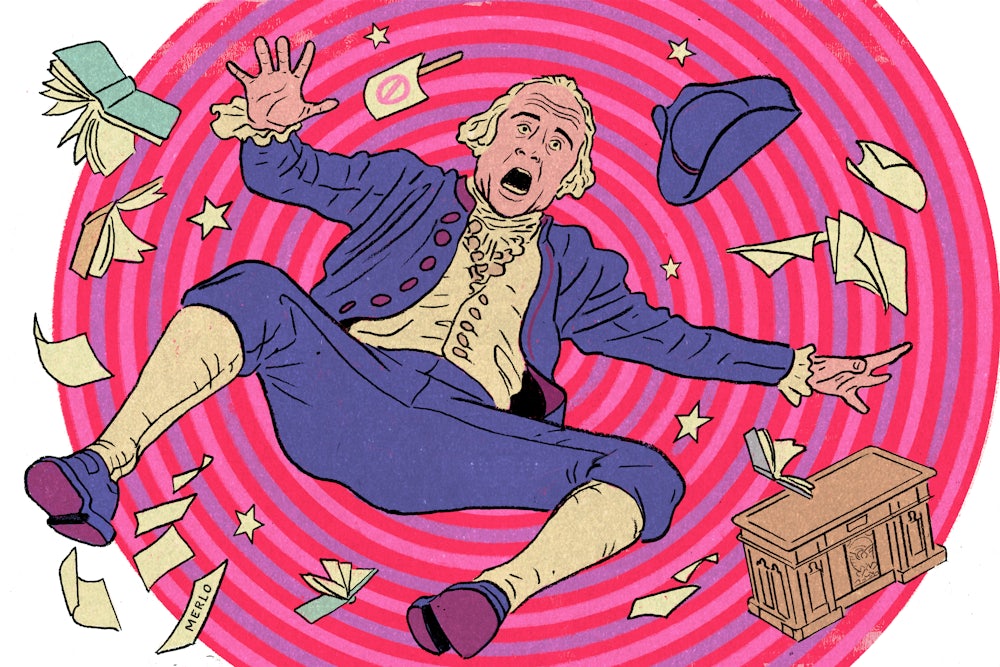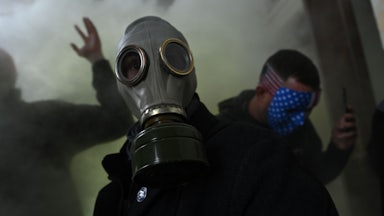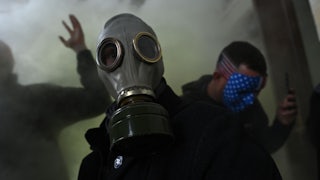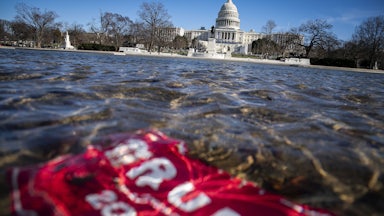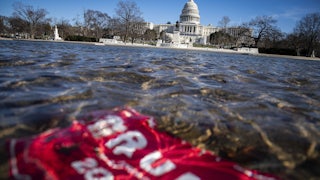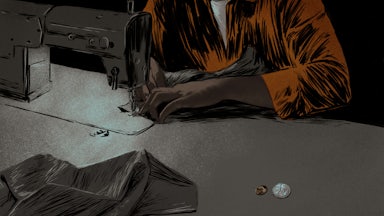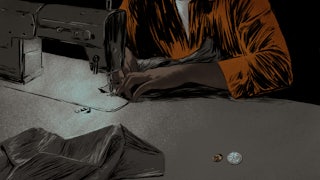I wanted to be president when I was younger, but grew out of it before middle school. Some people never do. If all goes according to plan, we will have a new president come Wednesday afternoon. The conditions are not exactly auspicious. In the wake of the attack on the Capitol, thousands of soldiers have been deployed to secure the inauguration, while the FBI has belatedly committed to vetting them for potential far-right sympathies. President-elect Biden’s team announced that the theme of the festivities would be “America United,” though there are other words that come to mind to describe the state of a nation reeling from grief and years of escalating political violence. But that is what presidents do: peer through a teleprompter into Americans’ homes and reassure them that, despite what their senses are telling them, everything is alright. Heads of state tell many lies, but this is among the lowest. The presidency is a bad job, but it’s one some people will do anything to get. I never thought that reflected well on a person.
During the summer of 2008, as presidential candidates began to fully turn their fire on one another, John McCain released an ad comparing Barack Obama to Paris Hilton and Britney Spears. He was, like them, nothing more than an arrogant celebrity. It was an attempt to turn the images of thousands flooding to the Democrat’s rallies against him. He wasn’t a once-in-a-lifetime political star, he was a performer on a stadium tour. The Republicans would learn later that you don’t fight a simulacrum of mass politics by arguing for its empty-headedness, you create an even more raucous show. But at the time, the right was trying to set up a choice between competence and continuity or an upstart outsider. (This was somewhat undone by Sarah Palin’s entrance on the scene.) Obama brushed it off, but surrogates went on the attack and lambasted McCain for being elitist, as evinced by a pair of $500 Ferragamo slippers he was spotted wearing.
This is a rite of passage: Men, and sometimes women, look out over a large and unlikely country that they have been broadly secluded from and say, I hear you, I see you, I will represent you. Immediately their opponents, with whom they have a great deal in common personally, attack them for not knowing the struggles of Iowan farmers or plumbers or firefighters. They are the worst and most obvious thing a presidential contender could be: out of touch. It is a perfect accusation, because it cannot be seriously denied. Of course they are out of touch. They tend to hail from a few universities, have often accumulated wealth beyond a scale most Americans could ever hope to achieve, and spend all their time surrounded by aides, staffers, and other politicians. McCain’s charge that Obama was arrogant was clearly true, just as McCain was equally arrogant. They all are. These are the kinds of people who see a nation with millions of inhabitants, a history of nearly unceasing war, the power to extinguish all human life, and think to themselves, That is a job I would like; a job I deserve. Beto O’Rourke was mocked when he told Vanity Fair in 2019 that part of the reason he was running for president was that he was “just born to be in it.” His mistake was having said things too plainly. The president is often someone born to it, but they have to pretend it isn’t so, at least until the votes are counted.
Once they are in, they get to do the dirty work, which is more or less all of it. How much of it they do is hard to ascertain in the moment. In the last few weeks, it has been unclear who, exactly, is president. In some sense, this is clearly a constitutional crisis, but in another it is an elaboration of a theme for a swollen executive branch. A candidate is elected, and that person then selects a coterie of advisers and officials who might do most of “the work.” Later, some of these staff members write memoirs and, based on their political fortunes, we might learn exactly how much the president was actually doing. During the twilight of his administration, Trump’s daily schedule has stated that “he will make many calls and have many meetings.” He fell into O’Rourke’s trap. The presidency is about talking on the phone, having meetings, and then, maybe, being the decider. We afford it the solemnity of higher language, probably in part because the effects of many of those calls are too gruesome to bear without the scrim of reverence between us. The horrors of the last few years, combined with Trump’s refusal to play up to the role’s presumed dignity, give us an opportunity to behold the office itself. It isn’t a pretty sight.
In 2006, Barney Frank gave a speech that was later reprinted in The Nation warning of a threat to democracy: a plebiscitary presidency. As Frank described it, the rules of the game had changed under Bush. The only check on the executive branch was an election. After that, there was no meaningful debate to be had, particularly not in times of war. The oration has all the hallmarks of its era, attacking Bush for seizing extraordinary powers while still arguing in defense of extraordinary power—Frank agreed, for example, that “law enforcement people are the good guys and women,” who did need “new powers.” Bush’s presidency was a catastrophe that has still not been fully reckoned with, since much of its criminality took place abroad, beyond the public’s sympathies. But Frank, in his effort to isolate Bush, chose to contrast this theory of executive prerogative to that of previous presidents, going back to Jimmy Carter. They had all decided to adhere to “the requirements of the law.” The imperial presidency was, by this accounting, a rupture.
Frank did not cite Arthur M. Schlesinger Jr., but he may have been thinking of him. In 1973, in his own book and in the pages of The Atlantic, the historian laid out the claim that over time—and frequently as a result of war—the executive branch had acquired power far beyond that prescribed by the Constitution, leaving elections and impeachment as the only real means of restraint. When Nixon took office, he prosecuted secret wars and eavesdropped on dissidents. Contrasting this with the apparently noble intentions of preceding administrations, Schlesinger conceded that President Johnson’s last secretary of defense was right that the government “tak[es] its color from the character and personality of the president.” This was meant as an indictment of Nixon’s comportment, but it is nauseating to think that so vast a power as the United States has depended upon one man for its hue and shade. In response, there was a “new wave of proposals” in the late 1960s and early ’70s to impose limits on the presidency. In the wake of Watergate, there was something “irresistible” about Eugene McCarthy’s argument that the president should be “‘a kind of channel’ for popular desires” rather than a leader. This was, in the end, perfectly well resisted. There have been candidates who have tried to position themselves as public servants called to the moment by their fellow Americans, but rarely have they argued against the rapaciousness of the office itself. Instead, they say that they will wield it benignly and the American people can be trusted to elect only those who will do the same.
The executive branch has only ballooned since then and not to keep pace with the burgeoning needs of the citizenry. Bush was not the first to ignore the law, he was the latest. This has been the difficulty with thinking about the modern presidency. Gerald Ford, George H.W. Bush, and Donald Trump have all shown that the pardon can be used not only for acts of immense mercy but also to protect those who have been unlucky enough to get caught doing the president’s bidding. In an aside typical of the book, the leftist drama theorist Augusto Boal writes in Theater of the Oppressed, “Eisenhower proposed the invasion of Vietnam, Kennedy began to carry it out, and Johnson took it to genocidal extremes.… Who is the criminal? The president of the United States of America.” One could make a similar list about Iraq, this time running from Reagan through the second Bush. For a few days last January, we came close to being able to do the same with Iran. It appeared that there were no countervailing powers within the government capable of preventing Trump from escalating decades of saber-rattling into open warfare. Instead, the world waited on one man to decide the fate of millions.
Before Ford’s pardon of Nixon, Schlesinger wrote that what was at stake surpassed this particular administration. It was “whether [Congress and the people] wish to rein in the runaway presidency. Nixon’s presidency is not an aberration, but a culmination.” Given sufficient time, what appears first as a pinnacle becomes precedent. In 2006, the Supreme Court ruled in Hamdan v. Rumsfeld against the attempts to form military tribunals to try the prisoners at Guantánamo. It was celebrated as a rebuke to the administration’s claims to sweeping war powers with or without Congress’s consent. Years after his imprisonment and return to Yemen, Hamdan’s conviction was overturned. Guantánamo is still open, the National Security Agency is still listening, the president can still drop bombs in countries we are not officially at war with. Late in the Trump administration, Congress made attempts to act as a check, notably when the high crimes threatened other politicians. There are calls now, from senators and others, to dismiss Trump’s impeachment in the interest of unity. It is galling, but presidential impunity is an American tradition.
Of course, the president is not only a warmonger. A year ago, at the tail end of a bitter, interminable primary season, many to the left of Joe Biden were involved in a long-running dispute over which candidate was best positioned to bring social democracy to the White House. This was mostly about domestic policy, because in the national discourse, the wars abroad had faded to the background. There was some acknowledgment that issues people had organized around, like universal health care and tuition-free college, would be difficult to address in the current political environment. While progressive writers and think tanks explained the various strategies a president could employ, this was also a return to Eugene McCarthy’s dream of a personal vessel. But the people, multiplicitous as they are, do not have one desire, and it is easy enough to block some through decades of austerity or a well-timed phone call from a former president. In the matter of making our lives better, the executive branch is broadly constrained by institutional and constitutional barriers. A signing statement will not universalize Medicare, and an executive order will not fund housing for all. As the high hopes of the Obama era soured, this became a common defense. The executive branch might be on “our” side, but it could only do so much. His administration was followed by one that was aware the president could do a lot. The trouble is, it’s mostly damage.
I am not as wont as others to proclaim the Founding Fathers as the ne plus ultra of thinking on liberty, but they are at times useful for reflecting on the rut we are in now. Schlesinger noted that they had debated the possibility of a plural executive, but they feared that factionalism would lead to inaction. Centuries on, inaction characterizes the whole of government, which has largely failed to address the great crises of our time and the one to come. The legislative branch has been engaged in a steady abdication of its duties. Instead, we have had presidents and their orders lurching this way and that, doing and undoing. Between administrations, the continuities tend to come with casualties. In the last few months, the whole shining promise of “democracy” has been reduced to elections between candidates who know they will deal in death, but for whom health care is largely beyond their purview. So it is hard to see how that office could hope to heal a nation. Trump was a long time coming, and there’s a long way to go. The casting of votes and the storming of the Capitol did not interrupt what has been, for many, a great period of suffering. Who can feel free when we are everywhere hemmed in by the landlord, the husband, the boss, the cop?
Democracy may have been reduced to a crude civic formalism, but many are still fighting for a democratic life. It is a small but pernicious act of misremembering to say that people died for the right to vote and leave it at that, as though the vote wasn’t a means to something else. People fought for the right to their own lives. The presidency cannot deliver those to us, but we can win them ourselves. It will be hard work, but we’re already born to be in it. We might as well make our way out together.
